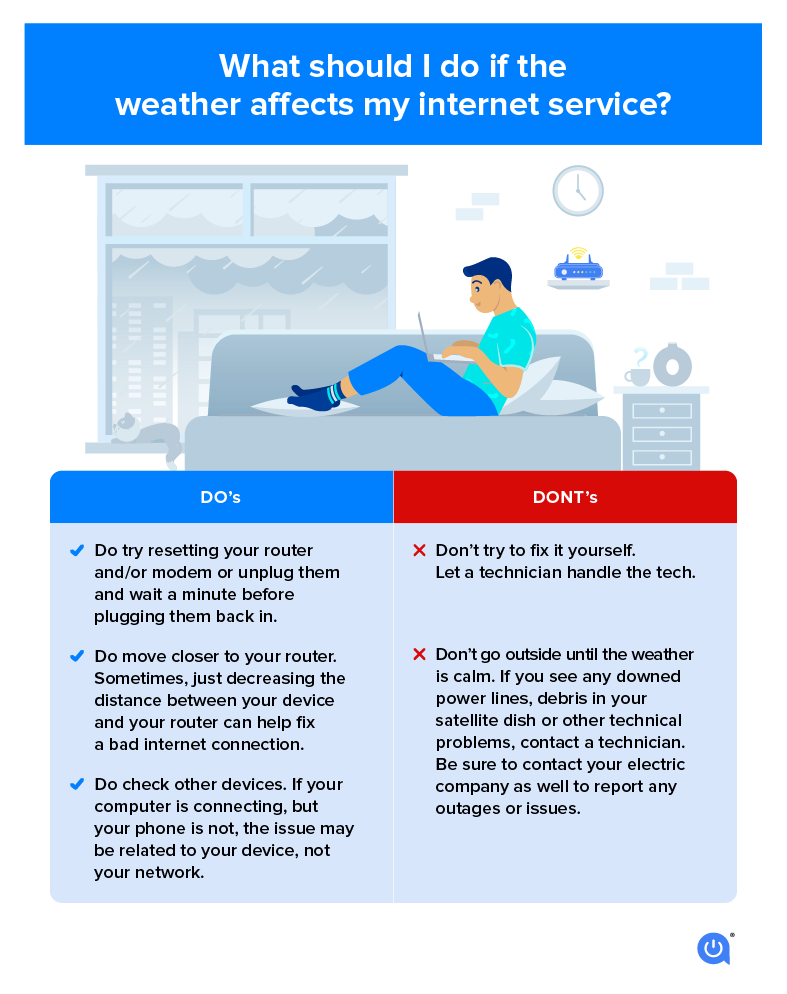There’s almost nothing more irritating than your technology not functioning when you need it to. On a rainy day when you can’t play outside, you might try to stream movies, but sometimes your connection seems just as bogged down by the poor weather as you are. Could the mist be clogging up cyberspace? Is the snow freezing your system’s circuits? Does weather affect internet speeds?
If you’re concerned that poor weather negatively affects your internet plan, read this before calling a service professional. The trouble may be less weather-related than you think.
Why is my internet so slow in poor weather?
Anecdotally, it may seem like bad weather and slow internet are a cause-and-effect pair. “Evidence from communities with light-pole-based public Wi-Fi suggests that rainy days had an impact on signal strength. While rainfall can create interference — in much the same way that it limits visibility for human eyes — attenuation due to distance from the router is a much likelier culprit for low signal strength,” according to Techwalla.
In other words, slow internet and bad weather are a correlation, not causation. Here’s what’s happening during those snowstorms and thunder-ridden nights causing your internet slowdowns.
High internet traffic is usually to blame for slow internet
Instead of the weather itself, a poor internet connection on a bad weather day is probably due to high traffic volume. When more people are stuck at home, they are more likely to be online, entertaining themselves by surfing, streaming and gaming.
How internet connection types fair in weather
Satellite: Heavy thunderstorms or snowstorms with thick cloud cover can cause your dish to temporarily lose a signal, but will usually reconnect on its own once the skies clear.
Cable: An outage is rare with a cable connection, but keep in mind that extreme cold can snap or damage ground lines, leading to a loss of your connection that would require outside repair work.
Fiber: Rarely affected by weather, a fiber line can also suffer breakage in very severe cold weather.
DSL: Also rarely bothered by weather, except in extreme conditions, DSL lines usually work in most situations.
Fixed wireless/5G: Also not usually interrupted by weather; heavy storms with hail could disrupt the signal. There is often a backup in place that would reroute data, however, if that happened.
How different types of weather can affect your internet
Any bad weather will affect our communications systems if it’s severe enough. The first utility to go out during destructive storms or wind is usually the power, taking your internet connection with it.
Rain and storms
Rain can lead to spotty connections if it’s hard enough. Those are generally temporary and will restore itself in most cases.
Heavy and prolonged thunderstorms have thick cloud cover that can block signals from satellites or cell towers so that short-term outages can be expected.
Snow and cold weather
Prolonged temperatures below 32 degrees can stiffen underground cables and may lead to snapping. This outage will require major repair, which means your internet may be out for some time.
Heavy snow accumulating on your satellite dish will interrupt your signal, but you must be careful with the removal of snow from the dish because you can cause it to shift, losing its own signal.
Winds (Hurricanes, high winds)
High winds are defined as sustained speeds of 40 to 57 mph. Those can shift or sway your satellite dish or cause intermittent outages for other connections. Hurricane-force winds range from 74 mph to over 150 mph. These storm-related winds can collapse towers and power lines, so all types of internet service will be disrupted in such events.
High heat
Temps in parts of the West can reach over 120+ degrees every summer. That type of heat mixed with dry conditions and high winds can lead to wildfires, which will cause longer-term internet outages by damaging cables, towers, stations and other infrastructure.
High temperatures can also keep your home’s HVAC equipment from running efficiently. If your internet equipment is in an uncooled home, it will fail with intermittent disconnections as it tries to cool off.
Expert tip: Distance from your router can be another culprit for slow download speeds.
If the sky looks gloomy or there’s snow on the ground, you may want to go upstairs to your bedroom to read a blog or head down to the den to stream shows and movies. This cocooning tendency may put you farther from your internet router, which can cause slow Wi-Fi.

What should I do if the weather affects my internet service?
If you think your internet is working slowly or has shut off, don’t panic! Here are five dos and don’ts to help you get your internet up and running again:
Do:
-
Do try resetting your router and/or modem, or unplug them and wait for a moment before plugging them back in.
-
Do move closer to your router. Sometimes, just decreasing the distance between your device and your router can help fix a bad internet connection.
-
Do check other devices. If your computer is connecting but your phone is not, the issue may be related to your device, not your network.
Don’t:
-
Don’t try to fix it yourself. Let a technician handle the tech.
-
Don’t go outside until the weather is calm. If you see any downed power lines, debris in your satellite dish or other technical problems, contact a technician. Be sure to contact your electric company as well to report any outages or issues.
See Allconnect’s News and Research hubs for more broadband guides and information.
Written by:
Robin LaytonEditor, Broadband Content
Robin Layton is an editor for the broadband marketplace Allconnect. She built her internet industry expertise writing and editing for four years on the site, as well as on Allconnect’s sister site MYMOVE.com. …
Read more

Edited by:
Camryn Smith-
Featured
![Fiber vs. cable internet: What’s the difference?]() Fiber vs. cable internet: What’s the difference? Camryn Smith — 3 min read
Fiber vs. cable internet: What’s the difference? Camryn Smith — 3 min read -
Featured
![Airlines with in-flight Wi-Fi: How to stay connected in the air]() Airlines with in-flight Wi-Fi: How to stay connected in the air Camryn Smith — 3 min read
Airlines with in-flight Wi-Fi: How to stay connected in the air Camryn Smith — 3 min read -
Featured
![What you need to stream TV: A beginner’s guide]() What you need to stream TV: A beginner’s guide Joe Supan — 9 min read
What you need to stream TV: A beginner’s guide Joe Supan — 9 min read
Latest
-
Thursday, July 25, 2024
Worried about losing your signal? This is how to keep your satellite dish cleanDavid Anders — 6 min read
-
Tuesday, July 23, 2024
The best free TV and movie streaming services 2024Camryn Smith — 5 min read
-
Tuesday, July 23, 2024
Everything you need to know about internet speedsRobin Layton — 8 min read






